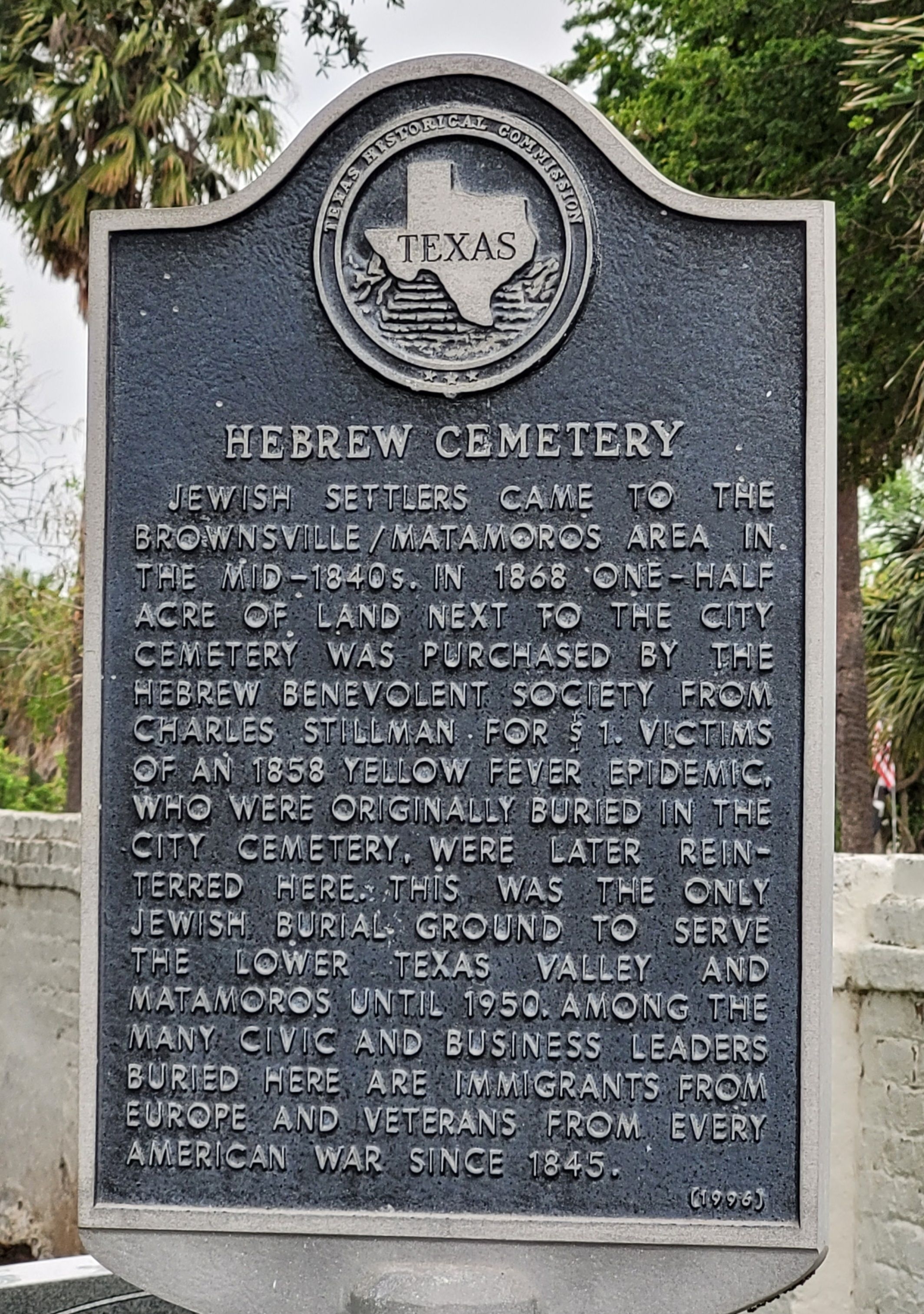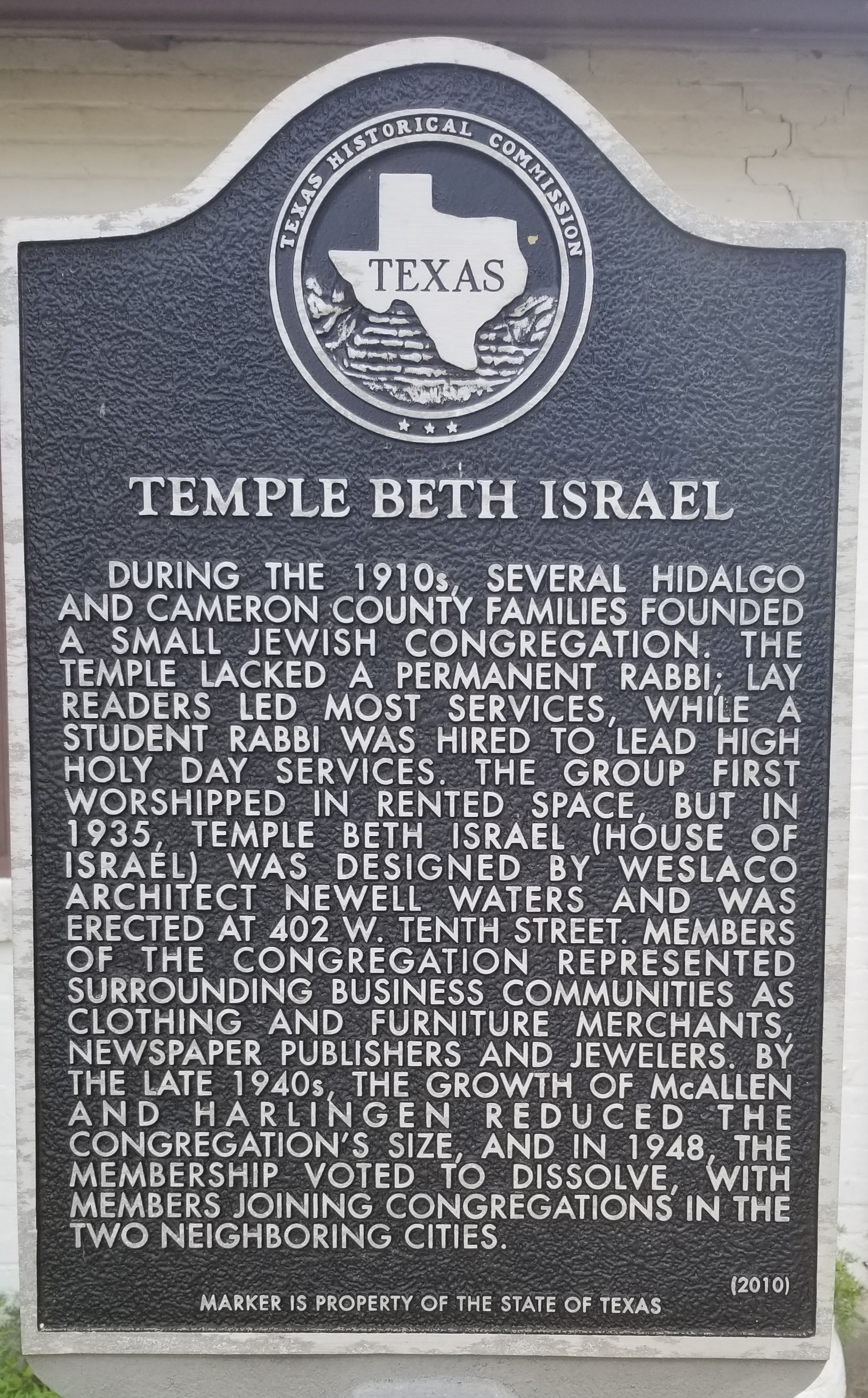

This research guide suggests resources relating to the history of the Hebrew and Jewish communities of the Rio Grande Valley. It also provides information on community members who have made a lasting impact on the Valley and includes links to sources.
The first people of Hebrew or Jewish ancestry arrived as early as 1521 with Hernán Cortés during the Spanish conquest of the New World. The Inquisition ruled 16th-century Spain, and Jews of Spanish descent (Sephardi) were persecuted heretics, who were subjected to racial violence, including arrest, trial, torture, and death. Some Jewish people were "penanced and reconciled" and converted to Christianity (conversos). Yet, some Jewish families and conversos continued to practice their faith in secret (Crypto Judaism).
The first Spanish and Portuguese Jews likely crossed from Mexico to present-day Texas during "El Reino de Leon" (1580) with Luis de Carvajal y de la Cueva. Carvajal was Governor of Nuevo Reino de León, but he was also a known slave trader, who was arrested in 1588 for illegally capturing native peoples and selling them into slavery. While awaiting trial, Carvajal was also charged and tried by the Inquisition in 1590 for harboring Crypto Jews, including his sister, Francisca, and her children. Carvajal died in 1591 while still a prisoner of the Inquisition. (Learn more: The New Kingdom of León, the Carvajal family and the Inquisition.)
The Goldring/Woldenberg Institute of Southern Jewish Life (ISJL) has further documented the long connection of Jewish immigrants from Europe to the U.S.-Mexico borderlands, including contributions to the cities of Brownsville, Harlingen, McAllen, and Mercedes and the wave of colonization in the 1830s - 1850s. Moreover, many individuals of Jewish and Hebrew descent have been instrumental in regional economic development, philanthropy, and local government in deep South Texas.


 Sam Feldman was born in Poland, where he emigrated from at age 12. Feldman lived in New York and other places in Texas before settling in the Valley in 1926. He was a WWI veteran and a member of the American Legion for 35 years. He was active in the business community having successfully established Feldman's liquor stores throughout South Texas. Feldman was also active in the Jewish community and served as president of Temple Beth Israel in Harlingen. Mr. Feldman and his wife Clara, raised two sons Charles and Henry.
Sam Feldman was born in Poland, where he emigrated from at age 12. Feldman lived in New York and other places in Texas before settling in the Valley in 1926. He was a WWI veteran and a member of the American Legion for 35 years. He was active in the business community having successfully established Feldman's liquor stores throughout South Texas. Feldman was also active in the Jewish community and served as president of Temple Beth Israel in Harlingen. Mr. Feldman and his wife Clara, raised two sons Charles and Henry.
During prohibition, Feldman was in the scrap metal business. He owned and operated Harlingen Iron and Metal Company. After prohibition, he distributed liquor wholesale but got into the retail business to sell off excess inventory after his business partner fell ill. In 1944, Feldman pled guilty to charges of violating price ceilings. Charles and Henry took over the operation of Feldman's Liquor Stores after their father died in 1953.
 Sam Perl (1898–1980), otherwise known as "Mr. Brownsville" was born in Podhajce, Austria. The Perl family emigrated to the U.S. and settled in Galveston in 1900. Upon seeing an advertisement for a men's clothing store in Brownsville, Sam and his brother Leon, sought to acquire it in 1926. Perl Bros. clothing store called The Fashion was located between 12th & 13th Streets on Elizabeth. The store relocated within downtown Brownsville a few times and boasted the most modern storefront in Brownsville in 1937.
Sam Perl (1898–1980), otherwise known as "Mr. Brownsville" was born in Podhajce, Austria. The Perl family emigrated to the U.S. and settled in Galveston in 1900. Upon seeing an advertisement for a men's clothing store in Brownsville, Sam and his brother Leon, sought to acquire it in 1926. Perl Bros. clothing store called The Fashion was located between 12th & 13th Streets on Elizabeth. The store relocated within downtown Brownsville a few times and boasted the most modern storefront in Brownsville in 1937.
Sam married Stella Cohn in 1928 and the couple raised two children. Sam, Leon, and Stella helped to establish regular Jewish religious services for the relatively small community in Brownsville. In the early 1930s, Temple Bethel-El was established with the assistance of the Perl family, and in the absence of an ordained rabbi, Sam served as the temple's spiritual leader. He was active in other community organizations, serving as a founding member of Charro Days, Brownsville Chamber of Commerce President (1945), and Chairman of the Brownsville Housing Authority.
Learn more Joseph, Harriett, and Sondra Shands. 1993. Sam Perl: Mr. Friendship and Mr. Temple Beth-El of Brownsville, Texas. Locus 5 (2): 145–61.
 Ben Levine was born in Poland in 1904, but his family emigrated to the U.S. in 1905. Sometime between 1924 and 1926, he moved to the Rio Grande Valley, settling in Harlingen where he opened The Man's Shop. He and his wife Fannie raised two sons, Lewis and Leonard, who eventually joined the family business.
Ben Levine was born in Poland in 1904, but his family emigrated to the U.S. in 1905. Sometime between 1924 and 1926, he moved to the Rio Grande Valley, settling in Harlingen where he opened The Man's Shop. He and his wife Fannie raised two sons, Lewis and Leonard, who eventually joined the family business.
Ben Levine was active in the business investment and Jewish communities. He served as a member of the local chamber of commerce, advocated for Jewish welfare, especially during WWII, and served as president of Temple Beth Israel in Harlingen.
Read more about the Levines and The Man's Shop in the Valley Morning Star, 19 Nov. 1968.

Ruben graduated from Brownsville H.S. (1935) and Brownsville Junior College (1937) and earned his BBA from UT-Austin (1939). After graduation, Ruben returned to Brownsville to help his father with the family business. He answered "the call" during WWII, joining the US Army and serving as an artillery captain in Europe. After the war, the three Edelstein brothers, Ruben, Ben, and Arthur, took over operations of the furniture stores and eventually grew the business to several locations throughout the Valley.
Ruben married Bernice (Kalmans) in 1956 and raised two children in Brownsville. The couple was prominent in community affairs and philanthropic organizations. Ruben was a Rotarian for nearly 80 years and served on the Brownsville Chamber of Commerce, Gladys Porter Zoo, and United Fund (now United Way). During his term as mayor of the City of Brownsville (1975–9), Ruben established the Brownsville Community Health Clinic, emergency medical services, and public transportation.

The Hebrew Cemetery of Brownsville (2nd and East Madison Streets) was recognized by the Texas Historical Commission with a marker in 1996. The marker reads:
"Jewish settlers came to the Brownsville/Matamoros area in the mid-1840's. In 1868 one half acre of land next to the city cemetery was purchased by the Hebrew Benevolent society from Charles Stillman for $1. Victims of an 1858 yellow fever epidemic, who were originally buried in the city cemetery, were later reinterred here. This was the only Jewish burial ground to serve the lower Texas Valley and Matamoros until 1950. Among the many civic and business leaders buried here are immigrants from Europe and Veterans from every American War since 1845."
Learn more about History of The Hebrew Cemetery, by Larry Holtzman from the International Jewish Cemetery Project website.

By 1931, the Temple Beth Israel Sisterhood was organizing fundraisers to establish a permanent place of worship for the Jewish community of Harlingen. The building was designed by Stanley W. Bliss and constructed by Blythe & Duerson. By 1949, Temple Beth Israel opened bids for the construction of a new building in its present location at 17th and E. Jackson Streets. Dedications services for the new Temple were held on June 24, 1951.
Learn more about the Jewish communities of Harlingen and Mercedes from the Encyclopedia of Southern Jewish Communities.

The congregation of Beth Israel was organized in the 1920s, but it had no permanent place to worship in Mercedes until 1935. In the early 1930s, members of the Temple Beth Israel Sisterhood organized several fundraisers to establish Temple Beth Isreal at 402 W. Tenth Street in Mercedes. By 1948 the congregation began shrinking as Jewish communities continued to expand and new temples were built in Harlingen (1951) and McAllen (1949).
In 2011, Temple Beth Israel was recognized as the first synagogue of Hidalgo County by the Texas Historical Commission.

Following WWII, the number of Jewish families in the McAllen area required a new Temple to be established in the upper Valley. In 1948, 28 Jewish families met in Pharr to begin organizing and the construction of Temple Emanuel began later that year. The building was designed by architect Zeb Rike and constructed by William E. Crawford. It was dedicated on March 20, 1949, and subsequently remodeled and enlarged in 1973.
The Temple Emanuel Cemetery located on South Ware Road at McAllen city limits was surveyed by the Hidalgo County Historical Commission in 1997. Learn more from the Cemeteries of Texas website.
Read more about the history of the Jewish community in McAllen from the Encyclopedia of Southern Jewish Communities -
Temkin, S. (2008). Luis de Carvajal and His People. AJS Review, 32(1), 79–100.
The research guides compiled by UTRGV staff and students are intended to assist patrons who are embarking upon new research endeavors. Our goal is to expand their knowledge of the types of resources available on a given topic, including books, archival materials, and websites. In so doing, our compilers have taken care to include collections, digital items, and resources that may be accessed not only through UTRGV but also via other institutions, repositories, and websites.
We wholeheartedly respect the research interests of others. Therefore, please contact us if you wish to submit a resource for consideration, or if you have a question about or an issue with a specific cited resource.
 A blast from the past! : windows to yesteryear from the archives of the Brownsville Historical Association, 50th anniversary, 1947-1997.
by
See Vol. 2, "The History of the Brownsville Hebrew Cemetery," by Chula Griffin
A blast from the past! : windows to yesteryear from the archives of the Brownsville Historical Association, 50th anniversary, 1947-1997.
by
See Vol. 2, "The History of the Brownsville Hebrew Cemetery," by Chula Griffin
 Studies in Brownsville history
by
See "Temple Beth-El, 1931-1981," by Harriet Denise Joseph
Studies in Brownsville history
by
See "Temple Beth-El, 1931-1981," by Harriet Denise Joseph
 Documentary film "Remember My Soul," by Jillian Glantz. From the cover: "Jews have been in the New World since Columbus landed in 1492, yet their presence in many regions has been largely overshadowed because of the common practice of being Jewish in secret, known as Crypto-Judaism. Remember My Soul unearths the history of Sephardic Jews in South Texas and explores how their contributions to regional customs & culture have shaped the identity of people in the borderlands."
Documentary film "Remember My Soul," by Jillian Glantz. From the cover: "Jews have been in the New World since Columbus landed in 1492, yet their presence in many regions has been largely overshadowed because of the common practice of being Jewish in secret, known as Crypto-Judaism. Remember My Soul unearths the history of Sephardic Jews in South Texas and explores how their contributions to regional customs & culture have shaped the identity of people in the borderlands."
Appointments are recommended for most new researchers. Our team is available in Brownsville and Edinburg to assist you with identifying resources.